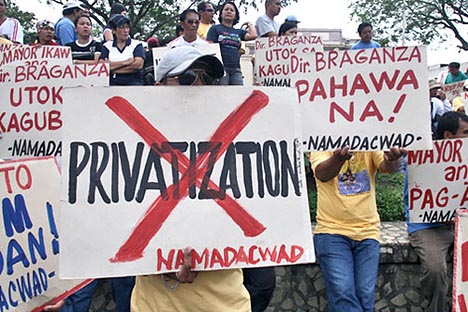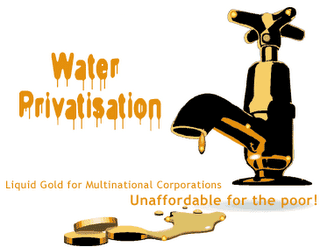Business groups and associations have played an active role in promoting privatisation as have individual corporations and financial institutions that see potential profit for themselves in privatisation. International financiers are also helping promote privatisation. Instead of loaning money to third world governments they now loan the money to foreign investors to construct and operate the infrastructure in developing countries.
 Deregulation of electricity in the US was primarily driven by business interests; in particular, industries that used large amounts of electricity and wanted to be able to reduce costs by doing deals with competing electricity suppliers, and private power companies that wanted an opportunity to make profits from the electricity business previously monopolised by the regulated utilities. For the same reason aspiring electricity traders (who buy power from generators and sell it to consumers and to electricity retailers) also lobbied vigorously for deregulation. The most prominent of them was Enron.
Deregulation of electricity in the US was primarily driven by business interests; in particular, industries that used large amounts of electricity and wanted to be able to reduce costs by doing deals with competing electricity suppliers, and private power companies that wanted an opportunity to make profits from the electricity business previously monopolised by the regulated utilities. For the same reason aspiring electricity traders (who buy power from generators and sell it to consumers and to electricity retailers) also lobbied vigorously for deregulation. The most prominent of them was Enron.
The Center for Responsive Politics points out that “during the first six months of 1996 alone, energy interests spent at least $37 million to lobby Congress and federal agencies on deregulation”.
In addition, millions of dollars were spent on “research, polling, television advertising and laying astroturf—developing grassroots organizations”. Most of it was aimed at decision-makers—politicians and bureaucrats—rather than the majority of electricity consumers.
A plethora of corporate front groups and coalitions were formed to promote deregulation including the Alliance for Competitive Electricity, Citizens for State Power, Electric Utilities Shareholders’ Alliances, the Alliance for Power Privatization, and the Coalition for Customer Choice in Electricity. Americans for Affordable Electricity coordinated the campaign for deregulation and spent $4 million a year on it on top of what each of its members spent. For example, Enron spent $25 million in just six months and allocated $200 million a year for advertising to win customers and “to persuade Americans to demand faster deregulation”. It also spent many millions more on political donations and lobbying state and federal politicians.
Individual companies have also played a role. For example, with respect to the privatisation of prisons:
CCA formed UK Detention Services Ltd (UKDS) as a joint venture with construction companies McAlpine and Mowlem, both major contributors to the Conservative Party. UKDS admitted that 'it took us two or three years to finally convince government that this [privatisation] was indeed the right course of action'.
The American Legislative Exchange Council (ALEC) promotes privatisation in the US through the development and promotion of model bills, many of which have been passed into legislation. These include:
Councils on Efficient Government have been established in in Virginia, Maryland, Arizona, Kansas, Oregon, Illinois and South Carolina based on legislation that is, in some cases, little changed from the ALEC model bill. The Councils "include representatives from the private sector, who then decide to let their business colleagues bid for public sector work. Such , has been enacted".
ALEC has also promoted tough criminal sentencing legislation (drafting model bills) that has increased incarceration rates that have benefited private prison companies including mandatory sentences, truth in sentencing and three strikes laws. In addition, during the 1990s ALEC produced model bills such as the "Private Correctional Facilities Act" to facilitate the establishment of private prisons.
The Coalition of Service Industries (CSI), a group of large US-based multinational for-profit service corporations, aims to open up the provision of all services to international ‘free trade’ and wanted large sectors of government services to be privatized and opened to foreign investment by its members. CSI’s ‘foremost goal is to open foreign markets to US business and allow them to compete abroad.’
 Darren Puscas of the Canadian Polaris Institute notes that many members of CSI are involved in privatizing public services and claims there is a ‘direct connection between the corporations involved in the push for privatisation of services (including many public services) and the push for trade agreements which will provide a legally binding lock-in for privatised services’ such as the General Agreement on Trade in Services (GATS).
Darren Puscas of the Canadian Polaris Institute notes that many members of CSI are involved in privatizing public services and claims there is a ‘direct connection between the corporations involved in the push for privatisation of services (including many public services) and the push for trade agreements which will provide a legally binding lock-in for privatised services’ such as the General Agreement on Trade in Services (GATS).
The European equivalent of the CSI was the European Services Forum (ESF), formed in 1998 (originally called the European Services Network). Its formation was supported by CEOs of leading European corporations and federations as well as Europe’s major employer association UNICE as well as companies that have benefited from privatization of services such as the giant water companies Suez and Vivendi/Veolia.
In the case of water, private water companies, in conjunction with the World Bank, organised a series of high level international water coalitions to lobby for and make recommendations for privatisation of water supplies and public private partnerships. These coalitions are closely networked (see figure below). The first of these was the  World Water Council—calling itself a leading water policy think tanks—and the Global Water Partnership, both established in 1996. They in turn established the World Water Commission and an international panel of ‘eminent persons’ on water infrastructure financing.
World Water Council—calling itself a leading water policy think tanks—and the Global Water Partnership, both established in 1996. They in turn established the World Water Commission and an international panel of ‘eminent persons’ on water infrastructure financing.
The figure below shows that how a few senior people from the private water companies and the development banks and the IMF have played pivotal roles in putting together and running a network of closely associated water coalitions to promote water privatisation. These coalitions have been described as a “kind of global high command for water”. They promote privatisation and private sector involvement in water supply through advice to policy makers, strategic reports and a series of international water fora (the World Water Forum) that are held every three years.

Since 2006, the World Economic Forum (WEF) has created the Global Agenda Council on Water Security, chaired by Margatet Catley-Carlson, who was president of the Global Water Partnership (GWP) (see figure above). The WEF has also produced a paper on water with input from Coca-Cola, PepsiCo, Nestlé, Rio Tinto and Dow Chemical, all lare consumers of water.
Another lobby group, Aquafed, the International Federation of Private Water Operators, was formed in 2005 by water transnational companies Suez and Veolia, and presided over by Gérard Payen, a former CEO of Suez’ water division. The European Water Partnership (EWP) formed in 2006 lobbies and provides advice on behalf of European water interests around the world. Its members include Aquafed and partners include Coca Cola Europe, BASF, the French Water Partnership, the German Water Partnership and the Netherlands Water Partnership.